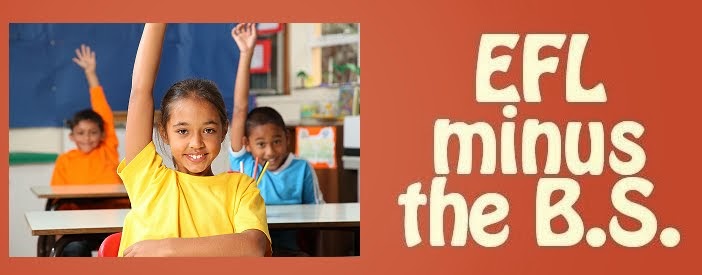PITY THE POOR
ENGLISH TEACHER
(GUEST BLOG BY WILL
LAKE)
I don’t
normally run guest posts on this blog, but when the noted blogger Will Lake
offered to write one, I jumped at the chance. (Notice I said ‘noted’ there, not ‘notorious’.) Here
it is:
PITY THE POOR ENGLISH TEACHER
To quote Don,
“Learning a second language is no walk in the park.” And I couldn’t agree more!
But I also believe that teaching a second language, especially English, is
equally no walk in the park! English is probably the most widely used language
in the world and as a result, each and every person uses the language in their
own unique way. Yes, sure we can give the students the basics they need to make
the most of the language, to communicate with other speakers and to make
themselves understood. The tricky part comes when they want to understand
native speakers!
They ask:
“Teacher, how can I improve my listening skills?” I reply (according my
training, research and judgement): “Listen more!” They ask, “how can I improve
writing?” Again, I reply ‘Read more!” But is it really that simple? I’ve
started to wonder.
Let’s take a
look at the way us ‘native’ English speakers use the language. Are you a
Scotsman, Georgie, Scouse, Mancunian, Londoner or even from the West Country?
Maybe you hail from the United States and have a deep south accent? Or you
might even be of Indian descent and speak the lingo with thick Indian accent?
It’s no wonder that students often feel flummoxed when trying to listen to
English!
So why should
we pity the poor teacher you might ask? Well, where do we as teachers, start to
teach a practical listening lesson that actually gives EFL students the ability
to listen to a native speaker speaking his (or her) normal everyday English?
How do we explain all the different little sayings, slang words and everything
else that every different English speaker uses? Ones that us native speakers
understand fine! How do we explain that a ‘chuck’ in Manchester is a word that
older women use to greet younger people, whereas in Australia it means ‘chicken’.
How do we sift
through the world of ‘lol’, ‘whr r u’ and all the other acronyms, abbreviations
that litter our everyday lives with the advent of mobile phones and the world
wide web? Where in the world do we begin to teach students how we really use our
language?
This brings me
back to Don’s original sentence. “Learning a second language is no walk in the
park”. Yes, I agree, unless they are living in an environment where English is
spoken all around them, they will find it extremely difficult to get the stage
where they can understand most of what us native speakers say. From a teacher’s
point of view, the language is so vast, and evolving at such a pace, we find it
difficult to know where to start! All we can hope for is that we teach them the
correct way to speak English and that us native speakers start to use the
correct way of speaking English sometime in the near future just to give
students, and us teachers, a fair chance!
In the face of
all these obstacles, I’ve seen some truly wonderful students over my few years
of teaching English and if you apply yourself you can do anything! The students
that find success in learning a second language are ones that truly apply
themselves! The same goes with English teachers; the successful English
teachers are ones that develop their skills and meet the needs of their
students.
xxxxxxxxxxxxxxx
William Lake
is a Lecturer of TEFL at Build Bright University in Siem Reap, Cambodia. He
publishes a blog called <a href=”http://blog.about-esl.com”>Blog
About ESL</a>.

No comments:
Post a Comment